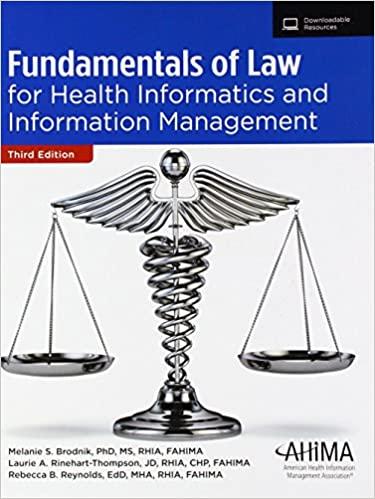Question
True or False. 1. The concept of reasonable accommodation, which figures centrally in disability discrimination law, first appears as a matter of federal law in
True or False.
1. The concept of "reasonable accommodation," which figures centrally in disability discrimination law, first appears as a matter of federal law in the definition of religion protected under Title VII.
2. The Supreme Court has ruled that the proscription of "racial" discrimination in the 1866 Civil Rights Act, 42 U.S.C. 1981, 1982, 1985(3), encompasses discrimination against Jews and certain other forms of ancestry bias.
3. Discrimination against religious minorities is never closely related to bias on account of national origin.
4. Title VII defines discrimination on account of "religion" to include all aspects of religious observance and practice, as well as belief.
5. Title VII explicitly requires "reasonable accommodat[ion]" of an employee's or applicant's religious observance or practice.
6. Title VII requires an employer to override a collective bargaining agreement or seniority system to accommodate the religious observance of an employee.
Group of answer choices 7. Given Title VII's deference to seniority systems Section 703(h), requiring an employer to override an existing seniority system or violate a collective bargaining agreement would constitute an undue hardship.
8. Title VII's requirement of reasonable accommodation for religious observance requires an employer to bear more than a de minimis cost to accommodate the religious observance of its employees.
9. In Trans World Airlines, Inc. v. Hardison, the cost of placing Hardison on a 4-day workweek or assigning another employee to work on Saturdays at a premium rate was deemed more than de minimis.
10. In Trans World Airlines, Inc. v. Hardison, Justice White's majority opinion also concludes that accommodating Hardison would itself have been a form of discrimination because it penalized employees that did not adhere to a religion that observed the Saturday Sabbath
11. Title VII requires an employer to provide any requested religious accommodation that is preferred by an employee so long as it is reasonable and provided it does not impose an undue hardship.
12. An employer may satisfy its Title VII accommodation requirements by demonstrating that it has offered a reasonable accommodation.
13. In Ansonia Board of Education v. Philbrook, Philbrook, a schoolteacher, belonged to the Worldwide Church of God, which required him to refrain from working on six school days each year.
14. In Ansonia Board of Education v. Philbrook, the Ansonia Federation of Teachers, Philbrook's union, had a collective bargaining agreement with the Ansonia Board of Education allowing each teacher ten dedicated days leave for observance of mandatory religious holidays which were not charged against a teacher's annual or accumulated leave.
15. In Ansonia Board of Education v. Philbrook, an employee already absent three days for mandatory religious observances could not later use personal leave for any religious activity or any religious observance.
16. In Ansonia Board of Education v. Philbrook, Chief Justice Rehnquist's majority opinion states that where the employer has already reasonably accommodated the employee's religious needs, the statutory inquiry is at an end.
17. In Ansonia Board of Education v. Philbrook, Chief Justice Rehnquist's majority opinion holds that the extent of undue hardship on the employer's business is at issue only where the employer claims that it is unable to offer any reasonable accommodation without such hardship.
18. An employer does not violate Title VII by failing to provide religious accommodations where the applicant has not specifically (i.e., expressly) informed the employer of a need for religious accommodation.
19. EEOC v. Abercrombie & Fitch Stores recognized that actual knowledge of the need for accommodation is not required, an applicant need only show that his need for an accommodation was a motivating factor in the employer's decision.
20. In EEOC v. Abercrombie & Fitch Stores, the district manager told the store manager that the applicant's headscarf would violate the company's Look Policy, as would all other headwear, religious or otherwise, and directed the store manager not to hire the applicant.
21. A state statute that provides employees with the absolute right not to work on their chosen Sabbath does not violate the Establishment Clause of the First Amendment.
22. A statute violates the Establishment Clause of the First Amendment if it has a primary effect that impermissibly advances a particular religious practice.
23. Educational institutions can assert an exemption from Title VII's prohibition of religious discrimination; specifically, it would not be an unlawful employment practice for a school, college, university, or other educational institution or institution of learning to hire and employ employees of a particular religion if the discriminating employer is, in whole or in substantial part, owned, supported, controlled, or managed by a particular religion or religious institution, or if the curriculum is directed toward the propagation of a particular religion.
24. Even if an institution with a religious affiliation is not within the protective ambit of 702(a) or 703(e)(2), it may still attempt to invoke Title VII's bona fide occupational qualification (BFOQ) defense to religion-based discrimination.
25. Our Lady of Guadalupe School v. Morrissey-Berru focused on whether the First Amendment permits courts to intervene in employment disputes involving teachers at religious schools who are entrusted with the responsibility of instructing their students in the faith.
Step by Step Solution
There are 3 Steps involved in it
Step: 1

Get Instant Access to Expert-Tailored Solutions
See step-by-step solutions with expert insights and AI powered tools for academic success
Step: 2

Step: 3

Ace Your Homework with AI
Get the answers you need in no time with our AI-driven, step-by-step assistance
Get Started


